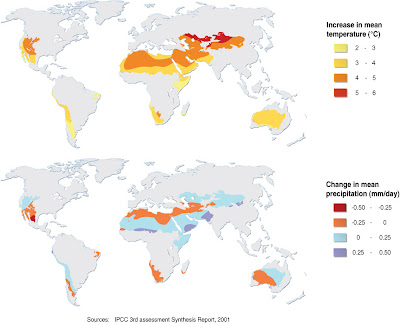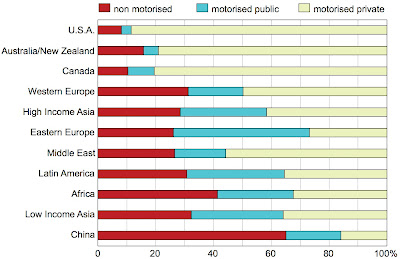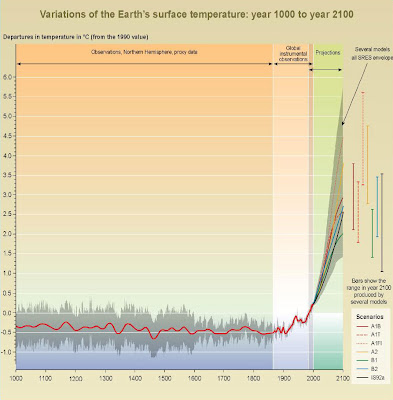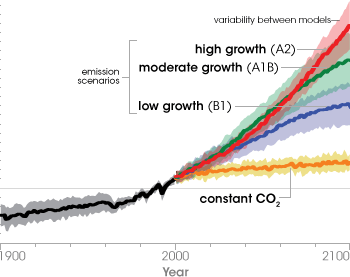Work in Progress: Human Impacts of Global Climate Change

Background
Until very recently, most climate change studies in the public eye have emphasized the technical causes and weather/geoscience implications of increased greenhouse gas production. Increasingly, however, scientists and policy makers also focus on human consequences – both how public policies can mitigate these effects and increasingly on how people might best adapt to changes that cannot be avoided.
For example, the latest “Assessment Report” by the Nobel Prize winning Intergovernmental Panel on Climate Change (IPCC), includes a separate, extensive working group report on “Impacts, Adaptation and Vulnerability,” as well as another on “Mitigation of Climate Change” with a 63 page chapter on transport discussing land use strategies. (It suggests that land use/transport coordination is likely to be more effective in developing countries, where there is both more opportunity due to their urbanization rates and more effect due to higher urban densities).

Another example is the 2007/2008 United Nations Human Development Report released last week, which emphasizes that perhaps the most problematic policy dimension of adaptation to climate change will be their distributional impacts. They argue that while each country will need to develop its own adaptation/mitigation strategy, the evident fact that residents of the poorest countries will suffer the greatest harm suggests a central role to be played by richer countries – most responsible for these problems, and most able to share aid – and multilateral organizations.
I am associated with a new, evolving project centered on U.S. security, broadly defined, and my responsibility (with many others, but let me mention fellow planner and one of the PIs, ASU’s Subhro Guhathakurta) is “human impacts.” For example, poverty is directly linked to political stability, among other issues and concerns. Political stability is in turn linked to economic growth and progress, needed to fund emergence from poverty. Thus poor countries are both most vulnerable by virtue of their geography and least capable of adaptation by virtue of their poverty. In addition, growing economies – the western wealthy countries but especially emerging powerhouses with large coastal presences such as China and India – are at crossroads with respect to their contributions to climate change and its consequences. In each instance, there are absolute and distributional tradeoffs to negotiate internally and internationally.

Progressing on a Work in Progress
Given this great breadth of topic and the finite resources of the project teams, the key themes of our most recent project meeting were the importance of, first, strategically framing our these questions vis-à-vis our credentials and interests, second, appreciating the complexity of human behaviors in this context and, third, emphasizing useful analyses and other contributions. That is, scope, complexity, and tasks.
1. SCOPE: The immediate challenge was to clarify our strengths, on the one hand, and intended scope and scale of our venture on the other. What do we bring to this set of issues and how do we prioritize what we want in return?
This involved a discussion of the starting point/objectives, with respect to issues, means, and resources. For example, it is important at this stage to identify and bound the core problems (e.g., with respect to issues, concepts, methods), then identify and bound the constituent problem elements. For example, who are the critical actors (kinds, numbers, at different aggregations, etc.), which behaviors are key (e.g., which decisions, explanations/determinants), which sectors are useful constructs in this context (individuals, public/private, non profit/ad hoc,…), how will geography and places matter, and how to characterize the relevant systems and their interactions (e.g., social, political, economic, ecological, geophysical, legal, historical,…)? Another question is how to bound the study process. For example, who and which areas of expertise are represented on the team as it stands, and how will this cluster function as an operational unit?

2. COMPLEXITY OF HUMAN/SOCIAL BEHAVIORS: Against this backdrop of problem statement, goals, means and resources, the human impacts discussion focused on what we do and don’t know about the complexity of human behavior, and the associated difficulty of anticipating adaptive behavior and other responses.
For example, as uncertain as specific GCC predictions of natural systems may be, they appear far more deterministic than social systems. There is much about the micro and macro details of social and individual actions and reactions that remains difficult to anticipate. That said, we know that individual and social mechanisms generally respond in an orderly manner to incentives and resources – the problem is adequately identifying and understanding tho se incentives.
se incentives.
An example is the causes and consequences of urbanization. There is a familiar litany of urban problems and an associated list solutions proposed to address them – most of which will not work as expected. These solutions generally are overly deterministic and underestimate how public and private markets mediate changing conditions, both good and bad. The feedback loops in human behaviors – the adaptive strategies that people use – continue to often be either misunderstood or misjudged. These behaviors extend not only to how individuals behave, say, during their drive to work or their choice of job or housing, but to their collective performance in groups, such as governments and corporations. Perhaps the best work in this area advises tentative, case-by-case strategies.
The key point here is that both private and public behaviors are extremely complex, yet subject to management. That management requires a keen understanding of and appreciation for the operation of private interactions (i.e., labor and housing markets) and public processes (i.e., institutions, governance, and collective operations).
3. TASKS: There was a proposal that our initial efforts might try to distinguish central from peripheral problems and concerns, primary from secondary impacts, and what’s been done from what might be done, etc. That is, to structure the discussion and clarify the lay of the land somewhat.
A more concrete suggestion was to (a) tentatively identify a series of questions/hypotheses we plan on asking of the IPCC and project team climate scenarios, within each of our areas of expertise and interest, and their relative importance (by whatever criteria), and (b) identify an associated literature and/or reading list of our own and other highly relevant materials for the project archive. This is a highly multidisciplinary group, and undertaking, so setting some terms, boundaries, and vocabulary might be a start toward making the linkages among them.

There were several extended exchanges on these questions, where we offered framing structures and questions for the climate scientists (e.g., the importance of distinctions between “gradual” and “abrupt” changes, markets vs nonmarkets, and spatial and temporal scales, or “levels of resolution,” as conceptual frameworks).

Next?
It will be interesting to us, as participants, to see how this continues to evolve and progress, and then what we’ll have to show you once we are ready to go public.
- Published:
- Sunday, December 9th, 2007
- Author:
- randall Crane
- Topics:
- adaptation, disasters, global warming, metrics, poverty
Blogroll
- Becker-Posner blog
- BLDG BLOG
- Burb
- CityStates
- Curbed LA
- Cyburbia
- DemocraticSPACE
- Environmental and Urban Economics
- Freakonomics
- LA Transportation Headlines
- Peter Gordon’s Blog
- Planetizen
- The Center for Land Use Interpretation
- The Transportationist
- the urban commons
- This week’s finds in planning
- Urbanicity
Journals
- Cityscape
- environment and planning a,b,c,d
- Harvard Design Magazine
- Housing Policy Debate
- Housing Studies
- International Development Planning Review
- International Journal of Urban and Regional Research
- International Regional Science Review
- Journal of Architectural and Planning Research
- Journal of Housing Economics
- Journal of Planning Education and Research
- Journal of Planning Literature
- Journal of Regional Science
- Journal of the American Planning Association
- Journal of Urban Affairs
- Journal of Urban Economics
- Planning Theory
- Regional Science & Urban Economics
- Transportation Research Parts A,B,C,D,E,F
- Urban Studies
- World Development
Comments are closed
Comments are currently closed on this entry.